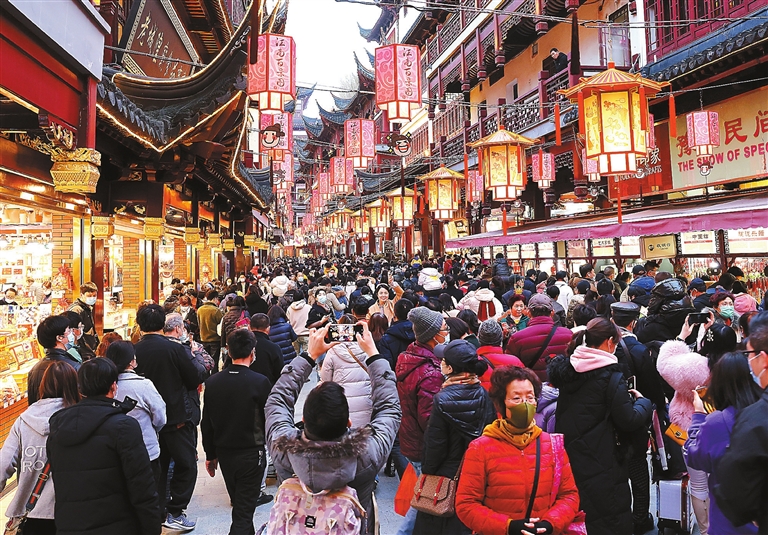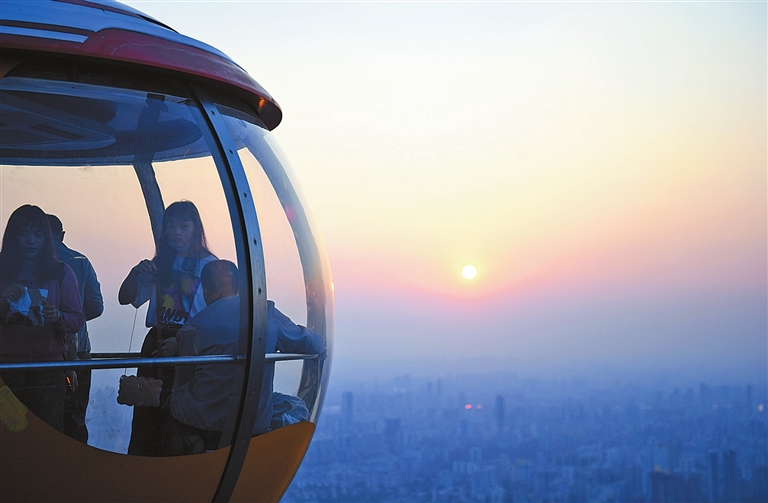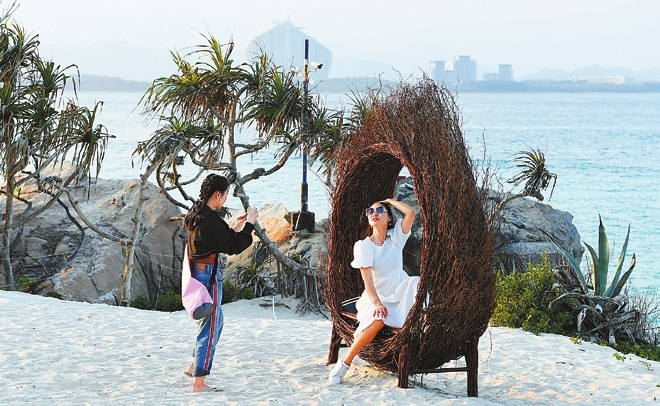



NEW tourist leisure options have become emerging drivers for China’s domestic tourism, with local tours and online tourism widely favored during the weeklong Spring Festival holiday. The holiday, also known as the Chinese New Year, lasted from Feb. 11 to 17 this year. Unlike in the past, when billions of passenger trips were made for what is the most important Chinese festival, many people have avoided long-distance travel this year to prevent the spread of COVID-19. In late January, the Ministry of Transport cut its passenger forecast flow to around 1.15 billion passenger trips for the 40-day Spring Festival travel season this year. It marks a drop of more than 20 percent year on year, and a plunge of over 60 percent from 2019. Short-distance joy Zhang Jiuling and her parents who have been working in Shanghai did not travel to their hometown in northeastern China during the holiday. Instead, they joined a city walking tour along the Huangpu River, where people enjoyed the juxtapositioned beauty of modern urban facilities and century-old buildings, which reveals the historical path of the city’s industrialization. They also visited museums and art galleries in Shanghai. “Staying put in Shanghai gave me a chance to get to know more about the city where I was raised,” said Zhang, 16. “I’ve found another kind of happiness during the Chinese New Year.” Zhou Weihong, deputy general manager of the Shanghai-based travel agency Spring Tour, said compared with the Spring Festival in 2019, the company’s local tourism products increased by 1.5 times, with the number of city walking tours surging by five times this year. “Some 80 percent of our guests were stay-puts,” she said. The average occupancy rate of hotels in Shanghai’s suburban areas, including Jinshan, Songjiang and Chongming, stood at 57 percent from Feb. 11 to 13. It is up by 27 percentage points from the same period in 2019, according to the city’s administration of culture and tourism. A report issued by the online platform Meituan showed that over 50 percent of its users preferred travel destinations within 50 km. In addition to traditional winter attractions like hot springs and skiing venues, urban zoos, botanical gardens and parks have become widely-browsed choices. Online travel agency Tongcheng-eLong said its hotel bookings from locals for the first three days of the festival were 32.5 percent higher than for the same holiday period in 2019. In Taiyuan, the capital of North China’s Shanxi Province, several tourist attractions are too popular to even get a reservation. Cloud tours After seeing the lost Buddha head shown in the television gala on the eve of the Spring Festival, Taiyuan resident Chen Fei drove to visit the Tianlongshan Grottoes to see the retrieved treasure, only to find the attraction was closed for forest protection and fire prevention. “Disappointed as I was, I have discovered the beauty and mystery of the grottoes online,” said Chen, 29. Through the WeChat official account of the Tianlongshan Grottoes Museum, Chen visited a digital restoration exhibition. It includes the pictures and messages of the retrieved head via virtual reality (VR) technology. Online tours have become a new trend for the people who stay at home. It enables them to enjoy the beauty of tourist attractions while avoiding potential cross-infections. In Shanghai, museums, art galleries and other public cultural venues held over 300 online exhibitions. Internet giants, including the Trip.com Group, Baidu, and Meituan, also hosted online activities to showcase the city’s cultural appeal during the holiday. In the resort-rich Yunnan Province in Southwest China, the online travel platform of “Go-Yunnan” has launched live feeds of famous scenic spots such as the Lugu Lake and the Meri Snow Mountain. Dai Bin, president of the China Tourism Academy, said that China is creating a space for cultural and tourism development where both locals and non-local tourists are integrated into a unified tourism market. “With the integration of cultural and tourism development and the introduction of science and technology, the sense of gain and satisfaction of the Chinese people will further improve,” said Dai. (Xinhua) | 
